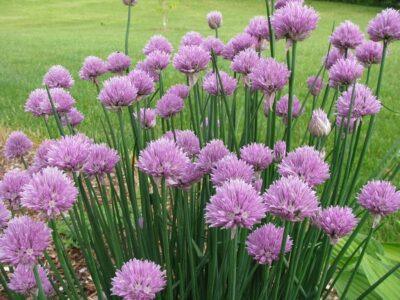Let’s be honest: health care is expensive. After all, you spend thousands of dollars on health insurance and taking medication that your doctor and Big Pharma say you need. And even if you’re young and rarely sick, it’s not uncommon for you to catch an illness from a friend or coworker. Or your child gets sick and goes to the hospital. Then the bills begin to pile up.
Can you prevent this from happening? Yes!
Perennial herbs are one of the easiest, most inexpensive ways to help improve your health. They are easy to grow because you only plant them once and they will continue to grow year after year. Not only that, but they can prevent you from getting sick and can heal many common health problems.
Here are five of my favorite perennial herbs – all of which can be grown indoors if you wish.
1. Chives
A member of the onion family, chives have beautiful purple flowers. They tolerate cold weather fairly well, and should be planted outdoors in early spring. After the flowers bloom, make sure that you remove the flowers or they may spread the seeds. But if chives do overwhelm your garden, they are easy to dig up and move.
The Hidden Secrets Of Making Herbal Medicines…Right At Your Fingertips!
In the Middle Ages, they were hung in the home to ward off disease and evil spirits. Chives help colds, stuffy noses, anemia and even upset stomachs. They’re popular on baked potatoes, but taste great on fish, omelets and chili.
2. Lavender
Lavender is the quintessential romantic plant. It’s been used in perfumes, sachets, soaps and lotions for hundreds of years. It is is native to Mediterranean landscapes; however, the popularity of lavender has spread throughout the world. But wherever it grows — whether in Oregon or England — this herb enjoys warm, well-drained soil, and full sun. When lavender plants die, it’s usually due to the soil being too damp, so make sure that you plant lavender in a sunny area.
Not only does lavender smell good, but it’s a powerful essential oil. Try using lavender essential oil to:
- Relieve tension
- Calm anxiety
- Improve circulation
- Clear acne
- Disinfect skin
- Treat head lice
- Alleviate psoriasis
Be careful with lavender and never ingest it; it should only be inhaled or applied topically. Ingesting lavender could cause blurred vision, vomiting, diarrhea and many more serious problems.
3. Lemon grass
Lemon grass is part of the grass family just like corn, wheat and your lawn. It’s a tropical plant and can work great as an indoor plant. When it’s planted outside, it’s only hardy enough for Zones 9 and 10.
This potent herb is known to fight cancer, infections and inflammation. But what I like most about lemon grass is that it’s popular in my favorite kind of food — Thai food!
But before you cook with it, make sure that you remove the tougher outer leaves and use only the pale stalk underneath. And don’t forget to dice the stalk finely and make sure that you cook it for at least 5 minutes or it will be completely inedible.
Lemon grass and basil shrimp stir-fry
One of my favorite meals that I fix for my family is stir-fry. Using fresh lemon grass and basil is the key to this delicious dish that your whole family will love. If you don’t like shrimp, just substitute boneless chicken thighs cut into bite-sized chunks.
Ingredients:
- 2 tablespoons coconut oil
- 1 tablespoon finely diced ginger
- 1 shallot, minced
- 1 tablespoon minced ginger
- 1 teaspoon lemongrass minced
- 1 pound of medium shrimp, deveined and shelled
- 2 tablespoons fish sauce
- 1 1/2 teaspoons raw honey
- 1/2 teaspoon red cayenne pepper
- 1/2 cup finely chopped Thai basil leaves
Directions:
Heat the oil on medium heat. Add shallot and cook until softened. Add ginger and lemon grass. Stir well. Add in the shrimp and sauté for about 3 minutes. Add the fish sauce, honey and the cayenne pepper. Mix well and cook until shrimp is pink, or about 4 to 5 more minutes. Serve over brown rice or noodles.
4. Mint
Mint is one of the most versatile herbs; it’s used in everything from cooking to keeping your breath fresh. Not only that, but it’s a very hardy plant. It can grow up to 3 feet high and tends to take over gardens, so make sure that you plant it away from other plants.
New “Survival Herb Bank” Gives You Access to God’s Amazing Medicine Chest
Growing up, I loved to go visit my grandma, who grew a variety of herbs in her backyard, including mint — my favorite. I would pick a mint leaf, stick it in my mouth and chew it like gum. To help calm a sore throat or to aid in digestion, I like to drink mint tea.
To make mint tea, all you need is a handful of mint leaves. Boil 2 to 4 cups of water in a tea kettle and pour over the tea leaves. Stir the leaves around to release the oils in the leaves; steep for 5 to 10 minutes. Pour the tea through a strainer and into a mug. And sweeten with raw honey.
5. Oregano
Oregano, a member of the mint family, makes a great ground cover. When the plants have grown 4 inches, trim the stems to encourage them to grow to a thicker bush. You can harvest the leaves when you need them; however, the best flavor comes right before the flowers bloom.
My favorite way to use oregano is to put it in spaghetti sauce. Not only does it make a great seasoning for Italian dishes, but it also helps the immune system. In fact, it’s so powerful that it’s been found to affectively treat the superbug MRSA. Trust me, I know! After I came down with a terrible case of tonsillitis and didn’t have any health insurance, I used oregano oil. To my surprise, I felt better in just 24 hours!
Want more herbs to help improve your health? Here’s a list of more powerful perennial herbs:
- Echinacea
- Fennel
- Gingko
- Lemon balm
- Marjoram
- Sage
- Tarragon
- Thyme
Becoming healthier and saving money on health care seems like a daunting task; yet planting perennial herbs and using them is an inexpensive way to help you and your family become healthier.
But if you’re still not ready to plant a garden, plant these herbs in pots instead. Just pick up some herbs at your local nursery, and you’re on your way to reaping the many health benefits of herbs!
Do you think that perennial herbs can improve your health? Share your thoughts in the comments below.
 Off The Grid News Better Ideas For Off The Grid Living
Off The Grid News Better Ideas For Off The Grid Living






